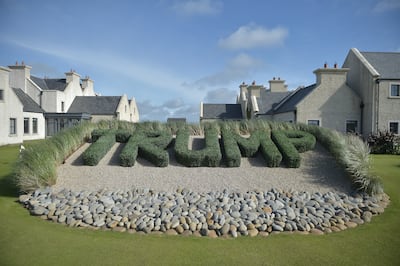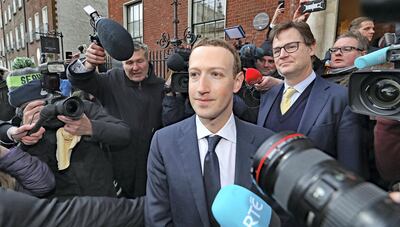Donald Trump professes to love Ireland. Although in that mercurial way of his, he’s also capable of declaring a loathing for it.
The country is the location for one of his golf resorts, at Doonbeg in County Clare. He bought the links and neighbouring five-star hotel for €15 million ($15.7 million) in 2014. The then Irish finance minister, Michael Noonan, was one of those on the red carpet to greet him.
But as is Mr Trump’s wont, he was later dismissive, saying at a campaign rally that he bought the complex during an economic downturn in Ireland, that he didn’t care about it any more and that it was "small potatoes".
The fact that it coincided with an application for a protective sea wall to guard the property against "global warming and its effects" (this, despite Mr Trump denying the existence of climate change) hitting planning buffers may have had something to do with it. That, plus Doonbeg, despite possessing a spectacular setting and luxury facilities, is struggling. It has racked up losses and seen the workforce cut from 230 to 112.
All this matters, because with Mr Trump, personal niggles can influence his thinking on bigger, more important issues. In Ireland’s case, the nation belongs to the EU and he wants to slap tariffs on imports from the bloc, plus, more specifically, the president-elect wants to draw US multinationals back from there. They went to Ireland attracted by its relaxed tax laws, the "Double Irish", that saw many of America’s corporate finest set up shop there.
They were able to use "base erosion and profit shifting", or Beps as it’s known, to avoid tax on their non-US profits. Technically, Beps was the largest tax avoidance tool in history, enabling them to shield $100 billion in annual profits from the US authorities. The Double Irish route was closed at the behest of the European Commission in 2014 but replaced by other devices, known as the "Single Malt" and Capital Allowances for Intangible Assets, or CAIA.

Mr Trump is all too aware of this, and how US companies helped to fuel the booming "Celtic Tiger" economy and regards it as a badge of honour to bring Apple, Microsoft, Alphabet, Facebook, Pfizer – the list goes on – home. The benefits they brought to Ireland were huge.
In 2018, 25 of Ireland’s 50 largest companies were US-controlled. They account for 60 per cent of Irish business taxes and employ 25 per cent of the entire local labour force. One estimate, from the American-Ireland Chamber of Commerce, puts the value of US investment in Ireland at almost €350 billion, more than Ireland’s GDP.
Not for nothing has Ireland been described as a US corporate tax haven and the biggest protector of non-US profits from the normally fierce "worldwide" US tax system. Mr Trump knows this. Add in Doonbeg and his failure to get what he wants and Ireland rankles.
His nomination for commerce secretary, the Wall Street investor Howard Lutnick, knows it too. He’s described it as ‘nonsense that Ireland of all places runs a trade surplus at our expense’.
That surplus has reached a record €35 billion, with Irish exports to the US up by 8 per cent in the first eight months of 2024, boosted by pharmaceuticals and chemicals. Goods exported to the US totalled €45.5 billion between January and August, according to the Irish government’s Central Statistics Office, compared with imports of €11 billion for the same period.
Faced with those figures and Mr Trump on the warpath, Irish politicians know it as well. Not surprisingly, they’re fearful.
So, with a general election due on Friday, the current Taoiseach and likely winner, Fine Gael leader Simon Harris, is setting aside “significant funds” in preparation for the effect of a Trump presidency. How much, exactly, is not clear, but “if three US companies left Ireland it could cost us €10 billion [£8.5 billion] in corporation tax", Mr Harris said this week, while canvassing in Dublin.
“I’m not pre-empting it; I’m not saying that’s going to happen, I’m not predicting it, but that is the level of risk that our economy is exposed to,” he said.

Mr Harris said he had no reason to believe that Trump was not “serious about pursuing the policies that he has campaigned on”, among them repatriating jobs and profits that he believes should be home-grown.
A recent front page Wall Street Journal article has fuelled Dublin’s anxiety. “The US tax system blows a windfall into Ireland” detailed how Ireland had built not one but two sovereign wealth funds on the back of US cash, including a €14 billion payment from Apple after a European court of justice ruling. Mr Harris insisted that Ireland would be prepared and would cope just as it did with “Brexit, Covid [and the] cost of living crisis”.
Just how so remains to be seen. If Mr Trump and Mr Lutnick are true to their word, the fallout could be savage. That, however, is also an "if". Previous form with Mr Trump, when he was in the White House the first time, suggests he uses such threats as a negotiating tactic. That certainly could be so where the EU is concerned – even he cannot dismiss the fact that international markets and supply lines are closely bound together. American companies, many of whom export to the EU or rely on components from Europe, would not relish being on the receiving end of retaliation from Brussels.
Where Ireland’s role in enabling US tax avoidance applies, however, it does not have the same, individual muscle. It’s hard, too, for the US company beneficiaries to claim mitigation – their pleas could fall on deaf ears. In the end it may come down to good will, that the damage to Ireland will be so considerable as to be impractical. Some sort of compromise may be reached.
Whatever happens, though, the authorities may live to rue the day they did not give permission for that sea wall.

